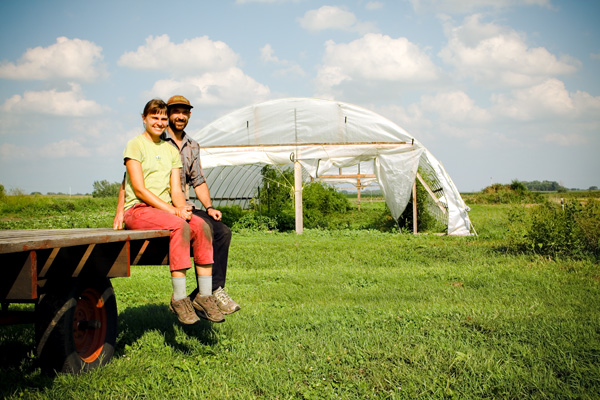
When I first see Laura Frerichs at her 40-acre farm in Hutchinson, MN, there’s a blue cloudless sky and the sun is shining. As I drive up, I can see the fields to the left, a greenhouse, and Frerichs in jeans, glasses, and a wide hat. She stands before a scale and starts weighing a watermelon for a customer. She chats about the watermelon crop with the local resident who is picking up the melon as part of a CSA box.
Later, she tells me that the connections she has with her customers are among the best parts of her job, because they truly value what her farm does. “You’re their personal farmer… after they’ve been getting their veggies from you for five years, that’s a real relationship,” she says.
Frerichs, 30, and her husband Adam Cullip, 31, are in their sixth growing season at Loon Organics, and Frerichs estimates that they are the youngest farmers in the area by about 15 years. They are growing 50 different crops this season – everything from salad greens and sweet corn to broccoli, celery, and romanesco, a fractal vegetable that Frerichs tells me is like a cross between cauliflower and broccoli.
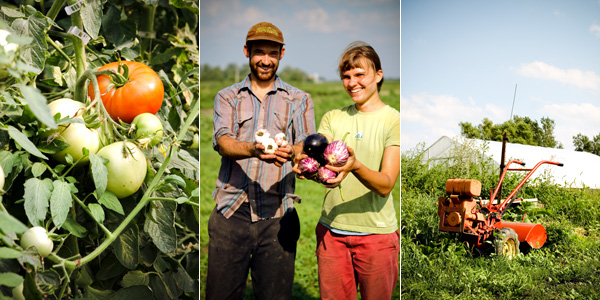
Frerichs says she didn’t really plan on being a farmer, and that if you told her high school self she would end up one, she wouldn’t have believed it. However, she learned more about agriculture and its role in civilization as an anthropology major at Grinnell. Then, one summer, she worked as a farmhand at Gardens of Eagan. She liked the work so much, she just kept finding opportunities to do it, going to different farms to learn even more.
“I really liked being able to do manual labor and working with your body instead of having to sit all day at a desk… that seemed to suit both Adam and I really well in terms of temperament,” Frerichs says.
Though becoming a farmer wasn’t her childhood dream, Frerichs admits there have been some major coincidences that occurred just as she got into it. For instance, she met her future husband Adam at a party the night before her first day of farm work (at Gardens of Eagan). When they started seeing more of each other, their dates involved eating fresh corn and fresh watermelon in the fields where she worked. Cullip, who at the time was a grad student, followed in Frerichs’ footsteps, later also getting more experience working on farms around the country, even traveling to Baja, California, to work on a date farm during the Minnesota winter.
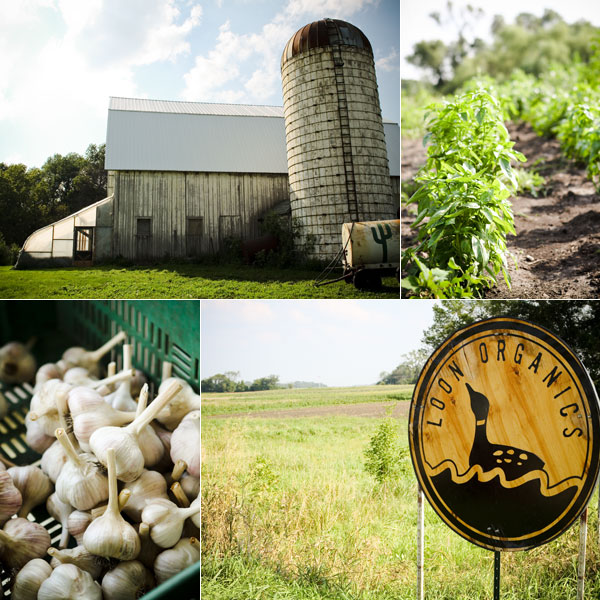
Then, Cullip and Frerichs caught a big break. Martin and Atina Diffley of Gardens of Eagan had two acres of land available that became a kind of incubator farm for Frerichs and Cullip to try out. While managing the two acres, they could continue work at Gardens of Eagan for extra income, could rent out greenhouse space, and had a place to live on the farm. According to Frerichs, it was a way to see if they could handle farming without the risk of buying a 40-acre farm. Frerichs says many young farmers face obstacles, such as finding land and handling the huge overhead associated with taking on farm management. However, Frerichs and Cullip got lucky. They started looking for farmland and eventually bought their current Loon Organics land from another young couple at an affordable price.
As we walk through the fields, I have to admit, this is some workplace. I breathe in fresh air and take in the open sky and plants growing everywhere. Frerichs nibbles on some homegrown celery as we walk. (Later, I have a taste too – it’s darker, sweeter, and stronger in flavor than supermarket celery.)
“Being able to eat your work is really amazing! Last night, the only thing in our meal that we didn’t grow was the quinoa and the olive oil,” she says. “We looked down at our plates… I could think about all of the work that was put into it, all of the time… and then, we get to enjoy it.”
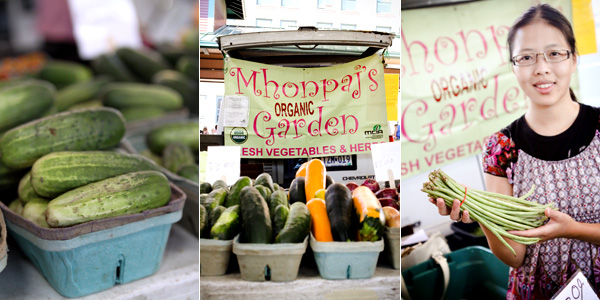
Another young farmer, Mhonpaj Lee, 26, came into farming in a very different way, through her culture. “It’s kind of like a requirement in the Hmong tradition to have a garden on the side,” she says, as I chat with her at the St. Paul Farmers Market where she sells her organic produce.
When Lee was growing up, she spent many hours with her family picking cucumbers for pickling. She says cucumbers remain one of her favorite foods to eat in the field.
“We make a cucumber salad. You just shred it up with graters, then sprinkle a sweet and sour sauce (sugar and lime) over it, and then hot sauce – that’s like the Hmong favorite sauce, “Lee says. “Or maybe hot dry pepper; some people like to eat it that way.”
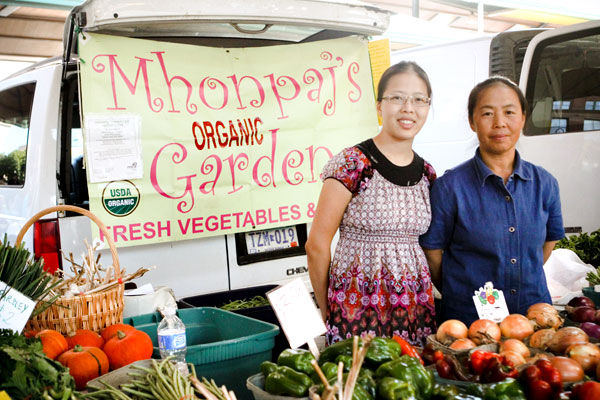
Lee says that farming was always a type of family hobby, but now that people are interested in organic produce specifically, she has tried to separate the business from the personal. Pitching in to help her farm plots near Marine on St. Croix and Stillwater are the over 300 people on each side of her family.
As a Hmong-American, Lee is often not just a farmer, but also a bridge-builder and educator. At her stand at the St. Paul Farmers Market, Mhonpaj’s Garden, she not only sells organic produce but also educates people on how to cook what she sells.
“I think a lot of exotic Hmong vegetables, people question it and they would probably walk away because it looks kind of weird, like long beans or bitter melon,” she says. At the farmers market, she sometimes hands out slips of white paper with Hmong recipes printed on them to people unsure of how to cook a particular item.
Additionally, Lee is also working on a project to catalog Hmong herbs and to preserve heirloom varieties. She and her family try to keep the seeds each year for greens and herbs, like a Laotian variety of cilantro.
Lee also works part-time as a Hmong translator at Hennepin County Medical Center. Her days are packed between her hospital work, then heading to her rented farm plots after 6pm. This past year, she also became a mother, so caring for her baby adds even more to her hectic schedule.
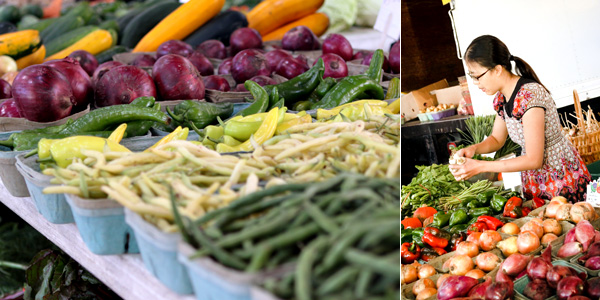
All her activities sometimes come together in innovative ways. For instance, Lee was pivotal in helping Hmong women at HCMC gain access to traditional Hmong herbs while in the hospital. In Hmong culture, women who have delivered a baby spend the next month on a particular chicken soup diet made with a variety of Hmong herbs. Lee had the idea of having a little herb garden on site at HCMC so that in-patient Hmong women can easily get the herbs they need. (Since then the idea has spread throughout the area, with a few other locations like North Memorial and a community college starting gardens as well.)
Lee says her work as a translator at HCMC is draining because she sees so much.
“You can go from someone dying to someone who just gave birth and then to a cancer patient who’s been there for like 20 years… where do you put all that baggage?” she says.
When she’s at the hospital, Lee sees so many conditions that could have been prevented. But it’s different at the farm. “When you go out there, it’s preventative,” she says. She sees value in her farming work because she is contributing to preventive care by growing healthy food for people.
While Frerichs and Cullip are well into owning their farm, and Mhonpaj Lee had some field experience picking cucumbers and gardening with her family, University of Minnesota Agriculture student Ruth Burke is just starting out. This summer she interned at a CSA farm called Cramer Organics in Delano, MN, and her plan is to run her own farm after five years of gaining education and hands-on work experience. (She wrote an 18-part journal detailing her newbie farming experience on The Heavy Table.)

Burke, 25, grew up in Long Beach, California – and did not live a farm girl life. She admits her only vision of a farm was visiting her uncle in Iowa during Christmas and seeing farm buildings and pigs.
Fresh out of high school, Burke joined the Marines, learned Korean, and was trained as a linguist. Later, she went to college where she studied biology, but found that working in a lab was “mind-numbing.”
“I was in the lab counting fruit flies on Christmas Eve a few years ago, and it wasn’t me,” Burke says. She started gravitating towards research projects that were outside instead of in the lab. One of her electives was agriculture, and once the class veered from commercial farming to sustainable agriculture, she got hooked.
“When I finally stumbled upon agronomy I thought this might be it because it touches all those things that are important to me – being outside, nature, being in tune with those [seasonal] cycles,” she says.
While unabashedly idealistic about her love of sustainable agriculture, Burke is also conscious of how hard it will be to run her own functioning farm one day. She says she is now “desperately trying to learn in 5 years what a farm kid has grown up learning and been exposed to every day in their life.”
While farming is a far cry from the Marines or from lab work, Burke is up for the challenge. She has accepted the uncertainty that comes with finding a career path that works for her. As she puts it, “When you are finding yourself, you’re going through a dark tunnel that’s filled with cobwebs and you just have to dig and dig and dig…”
For Burke, discovering her vocation has also meant literal digging.
“Right now I absolutely love harvesting potatoes because it calls my inner child,” she says. “You get down on your hands and knees and you dig through the dirt; it’s like digging for gold; you have to dig really far to find all these potatoes…When you were a kid you loved getting dirty and now I get to get dirty every day.”
She is less excited about pest control by hand. However, she credits her time in the Marines with giving her discipline and a strong work ethic.
“I don’t mind bugs, but potato beetle larvae are these little fat pink-red-orange chubby things that will just inundate plants, and you have to squeeze them. They pop, they squirt… Yesterday I was seriously gagging by the end of the field,” she says.

Burke sees a special role for young farmers, who, like her, are hopeful they can make a difference in agriculture. She mentions a program in Iowa her uncle told her about that gives incentives to traditional corn and soybean farmers willing to incorporate sustainable practices in their farming.
“It’s people my age who are working with the government to make these programs and then going out to the agricultural community and saying, ‘Why don’t you try this?” Burke says. Eventually, she sees young people as able to change the minds of older farmers and of a public still holding onto misconceptions about sustainable agriculture.
As for city girl turned farmer, you might say Burke is still in the honeymoon stage.
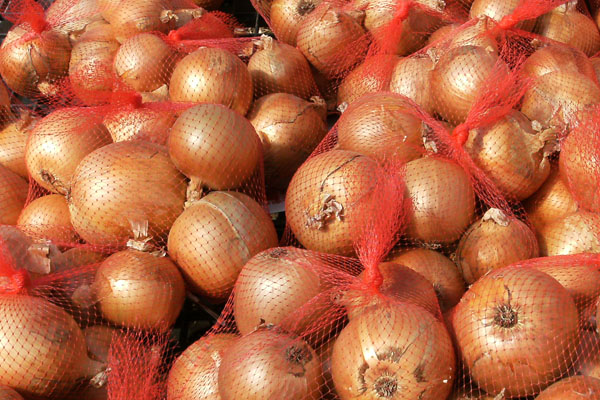
“l love going out in the early morning and seeing the fields full of stuff that you’ve grown. Don’t get me started on bringing home a box of vegetables that I’ve picked, I planted, I grew,” she says.
But, then again, maybe she’s just experiencing her true calling.
“I’m not a human being wandering around every day in city totally unconnected from the earth; I feel like I’m actually a part of the cycle… like I’m earning my place.”
Some online resources for aspiring farmers:
University of Minnesota, Extension Program (Agriculture)


Great article – thanks for covering these stories.
This was a great read, thanks.
Thanks for the article, I especially appreciate the Hmong perspective. Have you seen the short documentary/episode I did on Loon Organics? If you have a chance, check it out, its episode 15 at http://www.theperennialplate.com
Cheers
Daniel
The story about Mhonpaj Lee is my favorite. My sister and her boyfriend run a CSA, and they get a lot of volunteer labor from family, but 300 family members helping?! Fantastic.
Would love to read a more in-depth story on Lee’s work with women at HCMC. That sounds like an amazing program.
Nice article! It’s encouraging to see young people not only excited about sustainable agriculture but living out the dream.